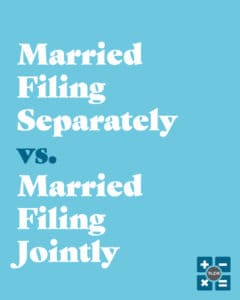If you are a married person, you (generally) have two options for filing your personal income tax return: Married Filing Jointly (MFJ) or Married Filing Separately (MFS). As you probably know, filing MFJ means that you and your spouse file one single tax return, which you both agree on and sign. If you file MFS, that means that you and your spouse each have to file tax returns, but you don’t have to sign your spouse’s tax return (and vice versa).
Filing MFS makes sense in situations where spouses are unable or unwilling to agree on or sign the same tax return. If the couple are not on speaking terms, or if one spouse is concerned about the accuracy of the other’s assertions, then MFS might be the best choice.
For couples facing a choice between MFJ and MFS, you might be wondering if there are advantages to MFS that would make it worth the additional paperwork, time, and filing fees. Let’s explore why some US couples choose to file MFS for financial reasons.
How Do Some Couples Save Money Filing Married Filing Separately?

Let’s take a quick trip to Montana. We know it’s a long trip, but bear with us because this is important. Montana is a non-community property (NCP) state. This means that each spouse is able to separately earn or gain income and property and that this accumulation of property can be tracked separately for each spouse.
If you file “Married Filing Separately” in Montana (or another NCP state), then you and your spouse split your income according to who earned it. If you earned $70,000 and your spouse earned $210,000, then this will result in the two of you filing very different tax returns. This is important because the income you enter on your tax return affects certain deductions.
Let’s say that you had $40,000 of medical expenses during 2020. For the year 2020, medical expenses are only tax deductible if they exceed 10% of your AGI. In our example, if you file separately then you can deduct medical expenses exceeding 10% of $70,000, or $7,000. This leaves $33,000 in medical expenses as deductible.
On the other hand, if you and your spouse filed MFJ, then your total income as a couple is $280,000. Only medical expenses exceeding 10% of this are deductible, which means that only amounts exceeding $28,000 can be deducted. Of your $40,000 in medical expenses, this leaves only $12,000 as deductible.
Our example is oversimplified, but the general rule is this: In situations where income is very unequal and the lower-earning spouse has significant AGI-limited deductions, it may be advantageous to file MFS.
Another situation where MFS could be beneficial is if the lower-earning spouse has an income-based repayment plan for federal student loans. Filing MFS could reduce the required minimum loan payment. However, all of these examples only work in NCP states.
What’s Different About Community Property States?
We know that many of our readers naturally live in Washington State because we’re a Washington-based company. Washington State is a “community property state,” basically meaning that everything you and your spouse earn or gain during the marriage is evenly split.

This is important. Since all of your income as a couple is evenly split, this means that when filing separately, you record half of your couple’s income rather than the income you personally earned. If our Montana couple from above was instead a Washington couple, then each spouse would have to record $140,000 on their MFS tax return. This eliminates the advantages regarding AGI-limited deductions.
That said, you may be able to reduce your income regarding income-based repayment plans for federal student loans even in community property states like Washington State. If you think this might help you, contact us so that we can evaluate your situation.
Will Married Filing Separately Save Me Money?

In Washington State, it is unlikely that filing MFS will save you money. The main reason to file MFS in Washington State would be for non-financial reasons such as those listed in our introduction: couples who are incommunicado or unable to agree on the details of their tax return.
Not only will filing MFS probably not save you on your taxes, it will also be more expensive to file. If you use tax software, you will have to pay for two submissions. If we file your taxes, we will charge you more to file the additional return(s).
Are There Disadvantages to Married Filing Separately?
It is important to keep in mind that filing MFS will eliminate or limit many tax deductions that are available to other filing statuses (Single, MFJ, and Head of Household). You may lose significant benefits, especially if you:
- Have children or are in the process of adopting children
- Qualify for the Earned Income Credit (generally for low-income taxpayers)
- Receive Social Security benefits, or tax credits for the elderly or disabled
- Are going to school or paying student loans
- Have an Individual Retirement Account (IRA)
Since there are probably no financial benefits to MFS in Washington State, and since you may lose out on some important tax breaks, we generally recommend that you file MFJ if you are able.
TL;DR: Choosing Married Filing Separately (MFS) for your filing status may save you money in certain circumstances if you live in a non-community property state. If you live in a community property state like Washington, you will probably not save any money with MFS. On the contrary, MFS will cost you more time and money, and you may lose out on significant tax breaks depending on your situation. If you have any questions about MFJ, MFS, or community property states, give us a call!






